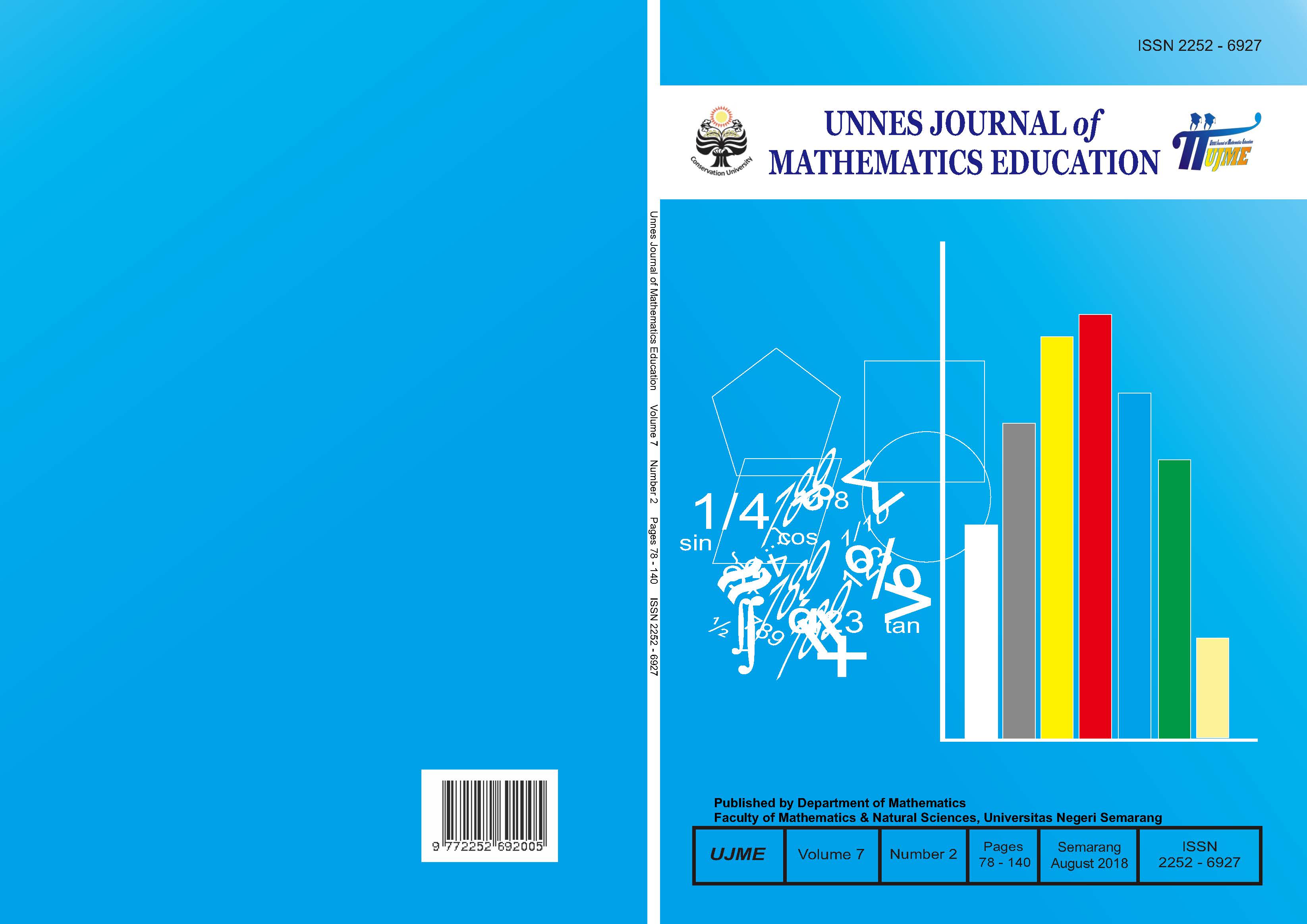The analysis of adaptive reasoning ability reviewed from students’ confidence in ethnomathematic-based treffinger learning model
##plugins.themes.academic_pro.article.main##
Abstract
The objective of this study was to examine whether ethnomathematics-based Treffinger learning model was good to improve students’ adaptive reasoning ability and to describe the adaptive reasoning ability based on students’ self-confidence level. The method of this study was Mixed Methods. While the population of this study was tenth grade science students of Wiradesa High School academic year 2017/2018. Again, the population was divided into 2 categories, they were the tenth grade of Science 2 was the experimental class and the tenth grade Science 1 was a control class. Eventually, the result showed that: (1) Ethnomathematics-based Treffinger learning model has good quality in improving students' adaptive reasoning ability since the planning and the implementation of learning process had good criteria, starting from teacher’s and student’s activities and the average of learning outcomes had reached the minimum score (KKM) and (2) the classification of adaptive reasoning ability was based on students' confidence level.
##plugins.themes.academic_pro.article.details##
References
Dawes, M. 2012. Advanced Thinking: Mathematics, General Semantics, Ways To Improve Relationships. http://jolt.merlot.org/-documents/hilbelink.pdf
Fitriatien, S. R.. 2016. Pembelajaran Berbasis Etnomatematika. Surabaya: Universitas PGRI Adi Buana Surabaya.
Herniyati. 2017. Analisis Kemampuan Penalaran Adaptif Matematis Siswa Kelas VIII SMP Negeri 2 Karangpucung Ditinjau Dari Rasa Percaya Diri. Purwokerto: UMP.
Huda, M. 2014. Model-model Pengajaran dan Pembelajaran. Yogyakarta: Pustaka Pelajar.
Kilpatrick, et al. 2001. Adding It Up: Helping Children Learn Mathematics. Washington: National Academy Press.
National Council of Teacher of Mathematics. 2003. Programs for Initial Preparation of Mathematics Teacher. Reston. VA: NCTM
Nisa, T. F. 2011. Pembelajaran Matematika Dengan Setting Model Treffinger untuk Mengembangkan Kreativitas Siswa. Pedagogia, 1(1): 35-48.
Prihandani, E.W. 2015. Model Treffiinger Bernuansa Budaya Jawa untuk Meningkatkan Kemampuan Pemecahan Masalah Matematika Siswa. Tesis. Semarang: Universitas Negeri Semarang.
Samuelsson, J. 2010. The Impact of Teaching Approaches on Students’ Mathematical Proficiency in Sweden. International Electronic Journal of Mathematics Education, 5 (2): 61-78. ISSN : 1306-3030.
Setyaningrum, A., Ariyanto, L,. & Sutrisno. 2017. Pengaruh Self-Confidence Terhadap Kemampuan Penalaran Matematis Siswa Kelas VII. Prosiding 2nd Senatik. Prodi Pendidikan Matematika FPMIPATI-UPGRIS.
Subekti, F.E. & Kusuma, A.B. 2016. Deskripsi Kemampuan Komunikasi Matematis Ditinjau Dari Rasa Percaya Diri Mahasiwa. Jurnal Euclid 3(1) hlm 430-446. ISSN: 2355-1712.
Sugiyono. 2015. Metode Penelitian Kombinasi (Mixed Method). Bandung: Alfabeta.
Wahyuni, A., dkk. 2013. Peran Etnomatematika dalam Membangun Karakter Bangsa.Prosiding Jurusan Pendidikan Matematika FMIPA UNY. ISBN : 978-979-16353-9-4.
Warda, A. K., Mashuri, & Amidi. 2017. The Effectiveness of SCSS Learning Model with KNWS Strategy towards Mathematical Creative Thinking Ability and Self Confidence of Students. Unnes Journal of Mathematics Education, 6 (3) : 308-317.
Wibowo, T. 2016. Adaptive Junior High School Students In Reasoning Mathematics Problem Solving. Yogyakarta: Proceeding Of 3th International Conference Research, Implementation And Education Of Mathematics And Science UNY.
